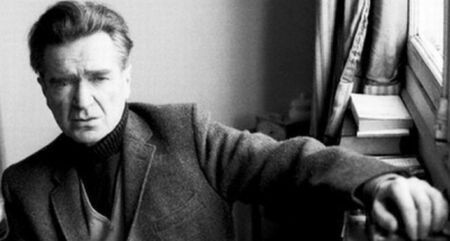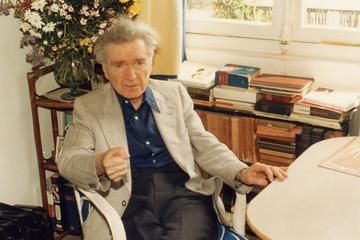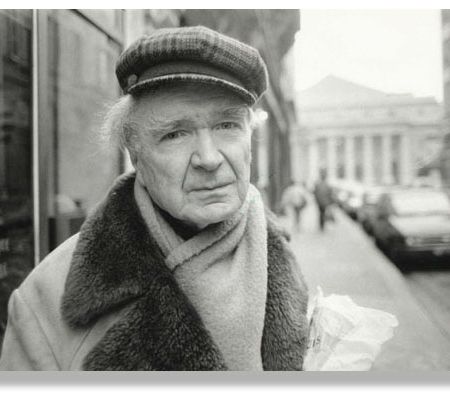Emil Cioran was born on April 8th 1911 in Rasinari, Sibiu, Romania, at that time a part which was a part of the Austrian-Hungarian Empire, a situation which proved beneficial for the future thinker, for from the very beginning he was in touch with three cultures : German, Romanian, Hungarian. Which will prove to play a key-part in his future education. The man who would leave Romania to become a successful French writer and one of the most artistic users of French language, the thinker who would deal with death, suicide, negation, nihilism and desperation, enjoyed in Rasinari a picture perfect childhood, and would often refer to the place as Paradise.
Unfortunatelly for him, the son of the orthodox priest Cioran, who prefered lazing around playing in the beautiful country of Rasinari and reading philosophy, was forced to pursue his studies in Sibiu, at the Gh. Lazar High School, the first major crisis of his life, when he left he had lost the innocence and treasures of childhood. An impressive inteligence, obsesed by death and despair, plagued by nervous breakdowns and insomnia, he would pursue his education at the University of Bucharest, where he enrolled at 17 to study … Philosophy. It was here that he befriended Mircea Eliade and Eugen Ionesco, a friendhsip that will last for decades, as well as Constantin Noica and Petre Tutea, the latter one having a keen admiration for Cioran, whom he considered a beautiful inteligence. The group, as well as several other young intelectuals, was particularly impressed and marked by Nae Ionescu, a professor at the University, journalist and philosopher, the most influential and charismatic intelectual in interwar Romania.

After graduating, with a paper on Henri Bergson, Cioran managed to obtain his first scholarship, to Berlin, in 1933, at a time when National-Socialism was at it's highest and the influence of Hitler and his politics was huge. In Berlin Cioran was so impressed and marked by Hitler and what he saw, that he didn't hesitate into sending several articles to Vremea magazine, back in the country, in which he confessed enthusiastically to this impression. He shocked and much later will deeply regret this simpathy for Nazi Germany, yet at that time he wanted something similar for Romania, a country which he despised with a loving passion. He made his debut in 1934 with On the Summits of Despair / Pe Culmile Disperarii, a shocking and powerfull book, a book of despair and suffering, followed by several other volumes published in Romanian. Each one of these was a scandal in itself, a thing that Cioran delighted in.
He was also impressed and a sympathiser of the Romanian Iron Guard and especially of it's leader, Corneliu Zelea Codreanu, although not all of the legionnary ideals were in consonance with his own interpretations about the role and destiny of Romania. Yet he published several articles and often presented himself as a legionnaire, both before and after Codreanu's assassination. It was another choice, maybe an error, maybe a way to shock, that he would regret much later. Decades after this episode, he would violently attack this episoed and the Iron Guard itself, not ever admiting that he was, once, so close to it.
Returning from Berlin he taught for a while at a high school in Brasov, enough to realise not only that he wasn't very good as a teacher, that he also didn't want to work. Ever. He once again left the country, this time on a scholarship for Paris, given by the French Institute in Bucharest for his doctoral studies. Cioran would eventually give up the idea of a doctoral diploma forever. And with the exception of a very brief return to the country, during the National-Legionairy regime, at the end of 1940 and beginning of 1941, he would never ever see his homeland again. It was during this brieft stay that he made another grave error, as he recorded an eulogy dedicated to Codreanu, exactly one day after Nicolae Iorga was killed by the legionnaires. It the same year he began writing his last ever Romanian book. Leaving for Paris, to remain there for good, he would give up Romanian language and begin writing in French.

It was only in 1949 that his first French book was published by Gallimard, after being rejected by others, and A Short History of Decay shocked and astounding the critics and public, and won the Rivarol Prize. It is interesting that fromt here on Emil Cioran refused any other literary prize, not matter how important it was or how big was the financial value. He would continue writing and publishing for the reminder of his life, travelled sometimes, yet kept away from Romania. Obsessed by style and the lirical content of his expression, marked by the same themes - God, revolt, despair, suicide, impossibility of happiness, absurdity of existence - he would end up enjoying a tremendous popularity, his books being real events and huge influences. He kept in touch with Eliade, Ionesco, befriended Samuel Beckett or Henri Michaux, but at the same time gave very few interviews and made a handfull of public appereances, preffering to ignore and violently reject his celebrity. Only in the last part of this life he would become much friendlier to the press and admirers.

Year after year, from his modest apartment where he lived in isolation, together with his great love, Simonne Boue, Cioran kept writing and putting his demons on paper, with a strong sense of the French language and a "mission" of corrupting and questioning anything and everything, often causing outrageous reactions, otherwise being one of the most influential authors. His rightwing past returned to haunt him eventually, yet he denied or retracted all he had written in favour of the Iron Guard, attacking and demolishing it violently. At the same time he ws seldom attacked for his oppinions of religions - mainly Christianity - love, suicide, life, happiness and on, and on.
Very ill and hardly recognising anyone, Emil Cioran passed away on June 20th 1995 and was buried at the Montaparnasse Cemetery. His popularity simply exploded after his death and his books are still best sellers in France and Romania, mainly, but also in Spain, Germany and Italy. A huge talent and a controversial figure, a difficult person and somewhat of a tragic actor, Emil Cioran could not be ignored, ever, by anyone
Photo : piticstyle.ro ; wikipedia.ro

































